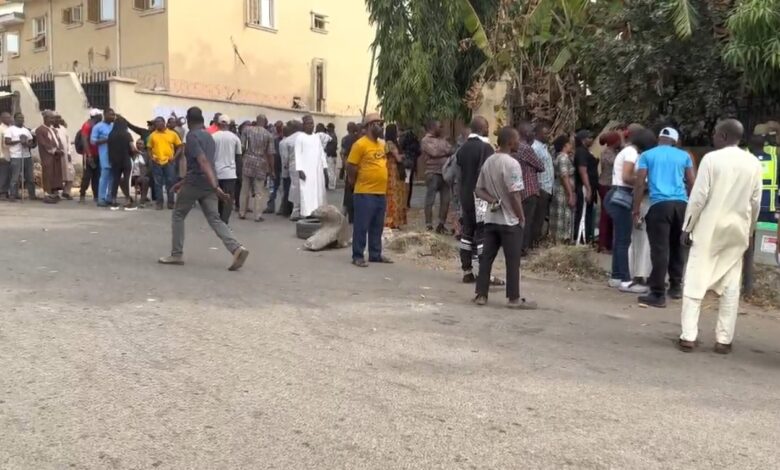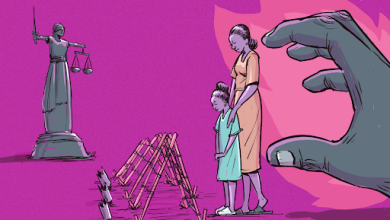#NigeriaDecides: Hate Speech Fuels Lagos Elections
After the controversial results of the presidential election, an atmosphere of hostility has emerged during the build-up to the gubernatorial polls in Nigeria's commercial capital.

In Lagos, the language being used during the elections has taken a nasty, ethnically-charged turn, creating an atmosphere of uncertainty. It has already led to bullying and harassment in the street and at work, and residents are concerned about safety.
Prior to Feb. 25, when the Presidential and National Assembly elections were held across the country, there was a noticeable trend with the campaigns of Labour Party’s first-timer, Peter Obi, and APC’s Bola Ahmed Tinubu.
While the supporters of the former believed that their campaigns which had begun on social media, would lead to their victory, the latter’s supporters did not hold the same view as they believed that their opposition’s popularity would never sway “real voters”, especially in Lagos.
The Labour Party recorded a historic victory in the state, defeating Tinubu, a former two-term governor in Lagos, and a state that has never lost to the opposition since the return of democracy from military rule in 1999.
Despite being declared president-elect by the Independent National Electoral Commission (INEC), the Labour Party’s victory in Lagos shows a paradigm shift from the old order. Not pleased with the outcome of the presidential election in the state, supporters of the ruling party have taken to social media to threaten local officials of the party to “brace up” and work for the party or be sanctioned.
The prize for Labour Party’s emergence
The presidential candidate of the Labour Party comes from the Southeast, and people from the region that are residents of Lagos began to face hostility after the presidential polls.
Francis Ebi, a teacher in one of the government-owned secondary schools in Ikeja, told HumAngle that he was threatened with retrenchment by his school’s principal.
Amaka Benjamin, a food seller in the Obalende area, said thugs who allotted space to sell food every morning warned her to be prepared to leave Lagos if the ruling party loses. She also claimed that some of her previous customers have stopped patronising her over the outcome of the last presidential poll.
Meanwhile, the intimidation that followed the election could make those that openly supported Labour Party think twice before coming out to vote on Saturday, March 18.
Ethnic campaigns on social media
While security agencies, particularly the state police command, have assured Lagosians of their safety, there have been massive online attacks on the Labour Party’s governorship candidate, Gbadebo Rhodes-Vivor.
His opponents and their supporters are questioning Vivor’s ethnicity. He suffers a barrage of allegations of being sympathetic to IPOB, a violent group now regarded as one of the top 10 deadliest terror groups in the world by the Global Terrorism Index, and who have been advocating for the creation of an independent state of Biafra in Southeast Nigeria.
Soon, some social media accounts began to make posts heavily laced with ethnic slurs and stereotypes as they tagged non-Yorubas, particularly the Igbos, as invaders and land grabbers who are out to take over Lagos by voting in one of their own.
Top gov’t officials involved
As the polarisation continues online and offline, the state government appears reluctant to address the issue and douse tensions.
Notable members of the ruling party have openly courted anti-Igbo sentiments. For instance, Bashir Ahmad, a media assistant to President Muhammadu Buhari, on March 5, sent a tweet playing into the divisive narrative that certain people are trying to take over Lagos state and that ‘original Lagosians‘ should prevent that from happening by voting in the APC
A few days later, Jubril Gawat, a media aide to Governor Babajide Sanwo-Olu, who is seeking re-election, was pictured in the company of some other persons, taking part in an ethnically divisive protest.

As Lagos governorship election draws closer, Igbo residents in Nigeria’s economic capital are facing threats. Photo: Jubril Gawat/Twitter.
One of the persons in Gawat’s company held a placard with the words “My Lagos, not your Lagos, you are only here because of your business,” boldly written on it.
Femi Fani-Kayode, former Minister of Aviation and a member of the APC presidential campaign council, wrote a hateful piece published by several online news platforms. In the article, he accused Igbo people of being ungrateful visitors in Yoruba land.
“We gave them land, food, and shelter, and now they want to take everything from us and rule over us,” the article read in part.
Implications
All of these, according to the Dangerous Speech Project, which researches the relationship between hateful speeches and violence, are likely to cause ethnically motivated violent attacks.
“Lethal violence from a group perceived as the enemy is a familiar technique of dangerous speech highly effective since if people are persuaded that another group is planning to attack or kill them, violence against the group becomes not only justified but necessary and virtuous.”
HumAngle understands that this is not the first time that hateful comments with ethnic sentiments have been deployed during elections.
A 2019 analysis by Advox Global Voices noted that the need by the opposition to paint any candidate as pro-Biafra was done to “revive the ghost of the acrimonious ethnic hatred that pitched Hausa against Igbo” in Nigeria’s early years, leading to a civil war from 1967 to 1970.
Support Our Journalism
There are millions of ordinary people affected by conflict in Africa whose stories are missing in the mainstream media. HumAngle is determined to tell those challenging and under-reported stories, hoping that the people impacted by these conflicts will find the safety and security they deserve.
To ensure that we continue to provide public service coverage, we have a small favour to ask you. We want you to be part of our journalistic endeavour by contributing a token to us.
Your donation will further promote a robust, free, and independent media.
Donate HereStay Closer To The Stories That Matter




